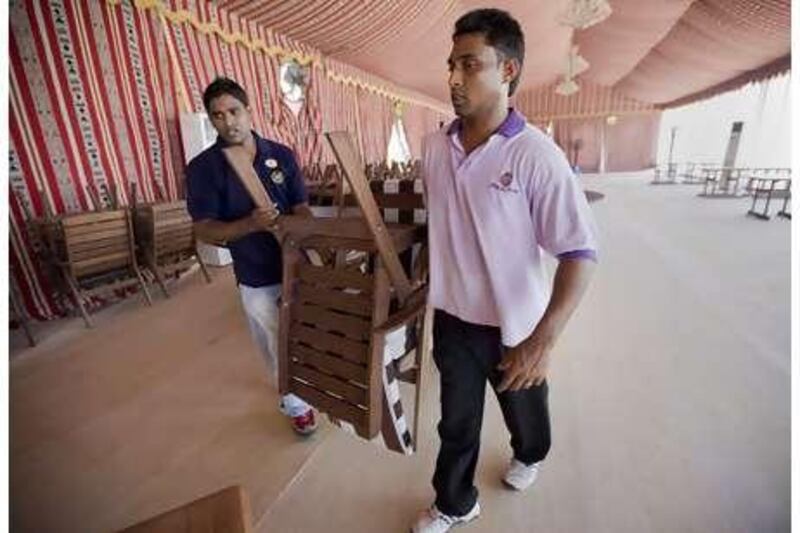It was perhaps inevitable that a massive iftar tent promising to provide nightly meals to more than 2,500 fasting construction workers would be in Dubai, the home to all things lavish. Open to Muslims of all nationalities, the tent is part of the 7th Ramadan Forum organised with the Dubai Department of Tourism and Commerce Marketing. It has been expanded to serve more fasters to keep up with demand, said Mohammed al Hashemi, the tent's supervisor.
In addition to food, the organisers plan to conduct cultural lectures in Urdu, Tamil and Malayalam and distribute leaflets and audio cassettes in several languages to explain the meaning of Ramadan. Workers can also take part in competitions to test their religious knowledge, competing for small gifts and cash prizes. There have been similar scenes across the country, as mosques and hotels rush to complete their Ramadan preparations. Supermarkets reported long queues into the night as families stocked up on the essential ingredients for a successful evening feast.
Among the more unusual preparations were those at Le Meridien Hotel in Abu Dhabi, where the artist Orly Abeledo has sculpted a desert scene complete with painted model camels and styrofoam palm fronds perched in sand. The camels, which are half the size of real animals, had to be coated with four layers of water-based paint as the oil versions would melt and drip in the heat, he explained. "It's 90 per cent ready and just needs final touch-ups," said Mr Abeledo. "I can say it's the centrepiece that will serve as the welcoming decoration for the guests."
Dania Malki, the spokesman for Le Meridien, said everything would be ready by Monday, when the hotel's tent opened for evening snacks and entertainment following iftar. Arabic lamps would hang from the cream-coloured satin ceiling and the tent would open out to a sea view, Ms Malki said. "There will be a live oud player as background music, and people can play with some cards and backgammon and smoke shisha, of course," she said. "It will be like a bazaar in Cairo. Even Arab expats miss such things from home."
As far as traditional cuisine goes, Basel Abboud, the hotel's banquet manager, said Egyptian fatir - a type of pancake - would be served. Guests with a sweet tooth could also look forward to a gooey Syrian-style ice cream prepared with a special mallet, Mr Abboud said. "He stirs and he hammers the fresh cream," he said. "Then he adds some pistachios." Almost every hotel in Dubai will provide an iftar meal and a late night tent for suhoor, serving food and drinks into the early hours of the morning.
Mohammed Trabelte, the events manager at the Grand Hyatt, said: "There's really two parts, we have the iftar meal at around 6pm in the ballroom and at about 8pm the suhoor tent opens. This is the main social event where friends and family meet and be together. It's a really sociable time and we see a lot of expats coming as well as Muslims." At Jumeirah Beach Residence's The Walk shopping arcade, there will be a 300-capacity tent. It will be called Hala Walla, which means warm welcome in Arabic, and serve North African and Arabic food throughout the night.
Haiyan Mujarkech, the chief executive of Dubai Retail, which owns The Walk, said: "Ramadan is about hospitality, compassion and serving the community." The Jumeirah Mosque on Beach Road in Dubai is also expecting to offer hospitality to large numbers of people. A spokesman for the mosque said: "I'm not really sure how many people come to the iftars here, it's a lot, though. There is normally rows and rows of food, all made by residents near the mosque.
"Anybody at all can come to the iftar meals, from all backgrounds, whether a construction worker or a businessman and [they] will sit down for a meal together." The Red Crescent Authority is setting up hundreds of tents, with many hotels and restaurants contributing food. The charity estimates it will serve more than 117,000 iftar meals at 13 locations. In Al Ain, eight locations will offer 72,000 meals and in Dubai, three locations will provide 30,000 meals. The charity's international iftar programmes will offer meals to 50,000 Muslims in 50 countries.
The offer of all those big meals after a day of fasting is bound to lead to overindulging, but Dr Abdullatif al Azazi, a specialist on how the body converts food into energy, advises against it. "When you overeat, 80 per cent of your blood rushes to your stomach and intestines," he told Abu Dhabi Radio listeners. "So it's no wonder you feel lethargic, sleepy and unable to concentrate after eating a heavy iftar or suhoor."
One girl, 12, who attended Friday's sermon at a mosque in Abu Dhabi, said this would be her second Ramadan fasting. "It will be no problem," she said. "I did it last year with my friends at school." Her favourite part of Ramadan is iftar. "We have a buffet at home every night," she said. garis@thenational.ae mkwong@thenational.ae relass@thenational.ae






